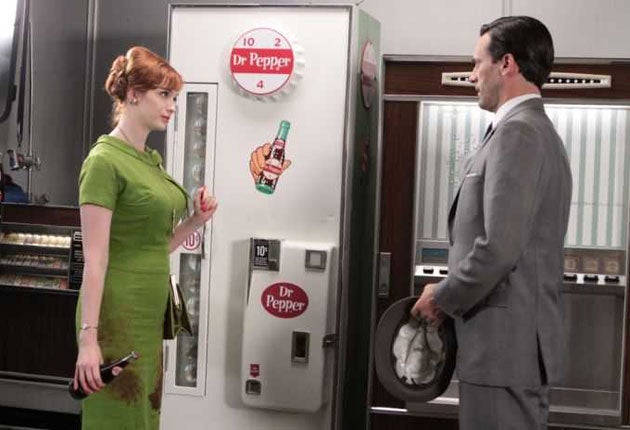American drama: Hit the road, Jack – and smarten up, Don
They outclass their British counterparts, but some American drama series are starting to lose their lustre, says Fiona Sturges

Much has been made of the golden age of US television drama in the past 10 years. And justifiably so. While British television has pretty much given itself over to home-improvement shows, cookery programmes and reality TV, with the occasional classy drama to keep viewers from committing hara-kiri on their sofas, America has given us a near-constant stream of decent and in many instances exceptional dramas – think The Sopranos, The Wire, The West Wing, Mad Men, Six Feet Under, 24, Damages, ER, House - each of them arriving with scope, ambition and apparently bottomless budgets. But while there's no disputing the fact that American studios have raised the bar with deftly written, intellectually challenging and terrifically acted drama, there's one problem that seems to afflict their shows: they don't know how to quit when they're ahead.
Last month it was announced that, after eight arduous seasons of kidnappings, assassinations, computer hackings, deadly viruses, radioactive meltdowns and Jack Bauer's steadfast refusal to crack a smile, 24 was finally being axed. When the series started in 2001, it was fast-paced, densely plotted and full of clever twists that effortlessly quickened the pulse. Played out in real-time and presenting a day in the life of a Counter Terrorist Unit operative, it was like nothing we had seen before.
But as the seasons went on it began to repeat itself and, worse still, parody itself with cartoon villains and plots that stretched your credulity to breaking point. Each series saw 24 desperately trying to outdo itself with the lengths to which Bauer would go to catch the bad guys.
The medical drama ER was another once brilliant series that outstayed its welcome. Its breakneck pace and meticulous attention to detail made it one of the best hospital dramas in television history for nigh on a decade but later it became complacent and lazy, swapping patient storylines and battles against hospital bureaucracy for soap opera-style shenanigans among the hospital staff. For me, the beginning of the end came with the beatific demise of Dr Mark Greene from a brain tumour while lying on crisp white linen in a house in Hawaii. But still ER limped on for five more series, apparently impervious to plummeting ratings and critical drubbings.
Other more recent imports have showed a similar decline in quality after just a few seasons. House, a medical drama about Hugh Laurie's prickly patient-hating New Jersey doctor, managed to maintain its momentum for two brilliant seasons before turning into a formulaic medical brain-teaser along the lines of Diagnosis Murder. The hugely hyped FlashForward, the thriller with Ralph Fiennes, burned out shortly after it began, with the heightened drama of the first episode, in which the human race undergoes a world-wide black-out, proving impossible for subsequent episodes to match. Even the endlessly extolled Mad Men, a show celebrated for its slow pace and elegant aesthetic, went through a lull in its last series, having sidelined two of its most compelling female characters, Peggy Olsen and Joan Holloway, and focused instead on the frustrations of the less sympathetic Betty Draper.
One of the main problems with so many of these dramas is the number of episodes in a given season. While Mad Men has around 13 episodes per season, ER and House average 24. With that kind of schedule it's no wonder that the writers struggle to maintain the tension. When you consider that some of the world's most experienced film directors struggle to keep a two-hour movie on course, it's little wonder that small-screen directors are apt to struggle with a drama that is expected to run at up to 24 hours per season, at one season per year.
Of course, no drama series is without its flaws – sorry folks, but even The Wire had its off-days – and contemporary American drama has certainly come closer to perfection than most. If only they could understand that less is nearly always more.
Subscribe to Independent Premium to bookmark this article
Want to bookmark your favourite articles and stories to read or reference later? Start your Independent Premium subscription today.

Join our commenting forum
Join thought-provoking conversations, follow other Independent readers and see their replies